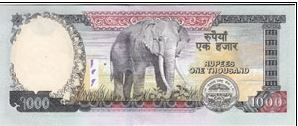
PREV ARTICLE
NEXT ARTICLE
FULL ISSUE
PREV FULL ISSUE
ELEPHANT ON NEPAL 1,000-RUPEE NOTE QUESTIONEDIt's not an error if a design feature was included intentionally, but these
features can become controversial, even if it takes decades for anyone to notice or comment.
Here's a story about a minor brouhaha over the elephant pictured on one of Nepal's
banknotes. -Editor
Whatever the reason, all pictures of animals printed on bank notes are said to be of animals found in Nepal — except for one, which has confused even wildlife experts. And that is the image of an elephant printed on the back side of the 1,000-rupee note, which, experts say, resembles the elephant found in Africa. This ambiguity has prompted many to suspect whether the 1,000-rupee notes have long been bearing the picture of an African elephant rather than of those roaming the country’s forests. No wonder, NRB, which issues bank notes, has started reviewing pictures of all animals printed on notes and is mulling their replacement with images of animals found in the country. Bank notes of 1,000-rupee denomination were first issued in December 1969 — although the history of bank note circulation dates back to September 1945. At that time, these 1,000-rupee notes contained the picture of a rural setting with Mount Annapurna in the backdrop. Then in December 1974, the design was reviewed and the picture of an elephant with long tusks was used. Since then, 1,000-rupee notes are being printed with the same picture of an elephant. The picture of the elephant used in the note, according to ‘Notes and Coins of Nepal’— a book published to mark NRB’s Golden Jubilee — is that of an ‘Asian male elephant’. But experts doubt it. "The picture contains features of both Asian and African elephants," Narendra Pradhan, an elephant expert, told The Himalayan Times. "For instance, the head appears to be that of an Asian elephant, as it contains two humps on the top part of the skull," he said. The top part of the head of the African elephant, on the other hand, is more round in shape. But the similarity ends here. "The appearance of the elephant in the picture, especially body size and ears, resembles those found in Africa," Pradhan added. African elephants are bigger and have larger ears, Pradhan said. "Also, the shoulder of the African elephant rises above the head, as in the picture." However, a wildlife expert working for World Wildlife Fund Nepal, said it would not be wrong ‘to call that elephant in the picture Asian’. "Its ears are not as big as those of African elephants and the body resembles Asian elephants," the source said. But she quickly added: "I don’t think it’s a real life picture. It must be artwork." NRB is not aware of the source of the image. "Many images were taken a long time ago. We don’t know who took them or from where they were extracted. But they are definitely not artwork," the NRB official said, adding, "We are planning to replace all images of animals with those found in Nepal." If things go as planned, the 1,000-rupee note will soon contain a picture of twin baby elephants — along with their mother — born some time ago at Chitwan National Park, according to the NRB source. To read the complete article, see:
Wayne Homren, Editor The Numismatic Bibliomania Society is a non-profit organization promoting numismatic literature. See our web site at coinbooks.org. To submit items for publication in The E-Sylum, write to the Editor at this address: whomren@gmail.com To subscribe go to: https://my.binhost.com/lists/listinfo/esylum All Rights Reserved. NBS Home Page Contact the NBS webmaster 
|
